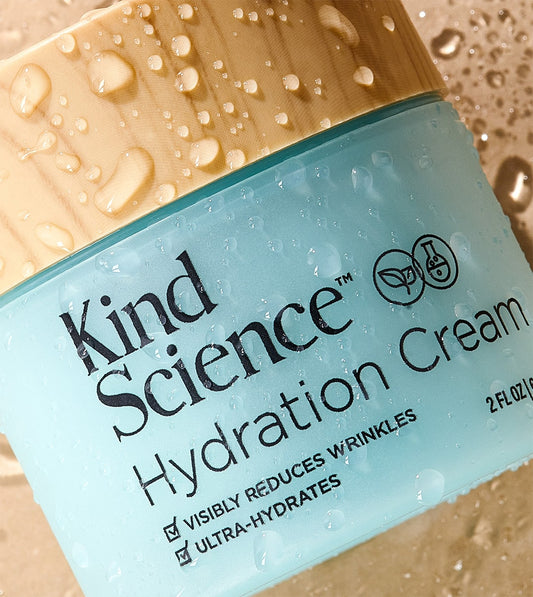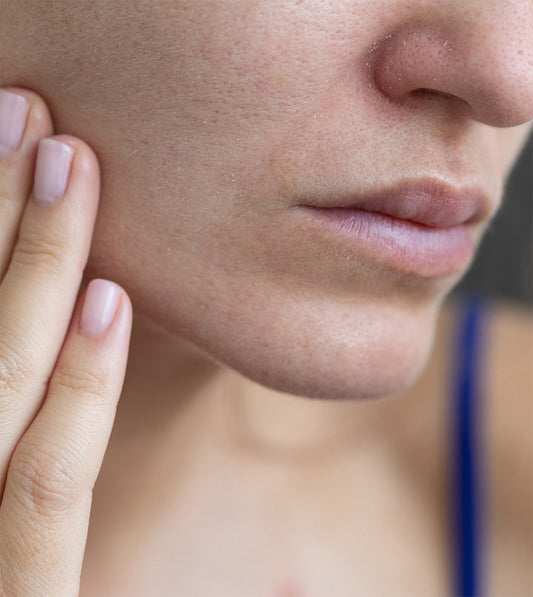Why Is My Skin So Dry? 8 Surprising Causes

A lot of people struggle with patches of dry skin on their face or body from time to time. It can happen to people of any age, and it's caused, quite simply, by a lack of moisture in the skin's cells. But what causes dry skin? Well, there are some obvious causes, like not drinking enough water or failing to use moisturizer as part of your skincare routine.
Then, there are some less obvious causes for dry skin, and some of them might surprise you! In this guide, we’ll take a look at no less than eight unexpected and sudden causes of dry skin. By learning more about what can cause your skin to dry out, you should be able to make better choices to keep your skin healthy, happy, and hydrated in the future.
Fake Fragrances
You might love the smell of your favorite facial cream or body lotion, but that very same aroma could be contributing to your dry skin problems. Studies have shown that synthetic fragrances, which are often added to cosmetics and skincare solutions to make them smell pleasant, can contain all kinds of chemicals that often do more harm than good to your skin.
For this reason, it's generally recommended to try to avoid products that contain synthetic fragrances. Look for fragrance-free alternatives, or try to focus on products that have naturally pleasant aromas, due to their natural ingredients and essential oils, such as jojoba oil, meadowfoam oil, and moringa oil.
Hard and Hot Water Dries Out Skin
This might sound strange, as one would assume that water couldn't possibly cause the skin to dry out. After all, water is a key component of life, and your skin's cells require water to stay full, plump, and healthy. However, the truth is that exposure to too much water, hard water, or water of high temperatures could make your skin dry out.
If you wash your hands or face too regularly, for example, this can wash away the skin's natural protective oils, causing irritation and redness. Similarly, if you take showers or baths that are very hot, the heat can cause your skin to dry out. Your home might also have a supply of hard water (water with lots of minerals) which makes moisturizers less effective. So, be careful when washing.
Certain Bar Soaps Dry Out Your Skin
Just like water, soap is another essential element for keeping your skin clean each day, and many of us soap several times a day to wash our hands and faces. However, the truth is that bar soaps can cause dry skin as they work by removing oil from your skin, and this can include the natural, protective oils that help your skin stay healthy and hydrated.
Dermatologists therefore often encourage people, especially those with dry skin, to avoid using bar soaps to clean themselves and choose more gentle cleansers and body washes, instead. This is much better for your skin overall and will have far less chance of leading to dry, red, or irritated patches.
Medications That Cause Dry Skin
We all know that certain medications can have side effects, but did you know that sometimes, those side effects can directly impact your skin? Indeed, there are certain forms of medication that can actually dry up your skin, leading to flakiness, dry patches, and a rough texture to certain areas of your skin. Blood pressure and cholesterol medications can also cause dry skin.
Skincare Ingredients That Dry Out Skin
There are so many different cosmetics and skin care products out there nowadays. They can have many different ingredients and formulas, and they can have totally different effects from person to person, as everybody's skin is different and unique. That's why it's so important to find the products that suit your skin the best.
If you’re using the wrong skin care products, this could be directly causing negative effects on your skin, including dryness and irritation. You might be reacting badly due to the presence of just one or two ingredients, for example, and it might be time to change things up and try some different, simpler, more natural skincare solutions instead.
Dry Skin a Sign of Over-Exfoliation
Another answer to the question of what causes dry skin could be too much exfoliating. Exfoliating is the process of using a scrub or chemical exfoliant to essentially rub away dirt, debris, and dead cells from your skin, and it's a big part of any healthy skincare routine - dermatologists typically recommend exfoliating once a week, for most people.
However, in some cases, overdoing exfoliating could cause your skin to feel very dry and worn out. This might happen if you're exfoliating too much and damaging the protective barrier that keeps your skin moist, or not exfoliating enough and allowing dead, dry cells to build up on the surface of your face. Try to find the right balance with exfoliating to get the best results.
Diet Causing Dry Skin
Your diet can have a direct impact on every part of your bodily health, including your skin health. Studies show that some of the foods we eat can make our skin look and feel different, and a good diet can give your skin a healthy glow, while the wrong foods might cause acne breakouts, oiliness, or even dry skin, too.
Specifically, a lack of certain fruits in your diet might make your skin dry out. How? Well, it's all about vitamins. Vitamin C, in particular, plays a big role in the production of collagen, which is a key protein that keeps your skin plump and healthy. If you don't eat much vitamin C (found in citrus fruits) then your skin may become weaker and drier.
Lack of Sleep Effects on Skin
Another surprising but true answer to what causes dry skin is a lack of sleep. Just like your diet, your sleep schedule has a huge part to play in your body's overall health and can directly impact the way your skin looks and feels. Why? Well, it's because your body uses the time that you're asleep to repair and regenerate your skin cells.
If you're struggling to sleep or staying up too late and not getting the recommended 7-8 hours each night, your body might not have enough time to rest and repair. This can damage the overall skin restoration process, while also making the signs of aging (like dry patches and flakiness) more common.




